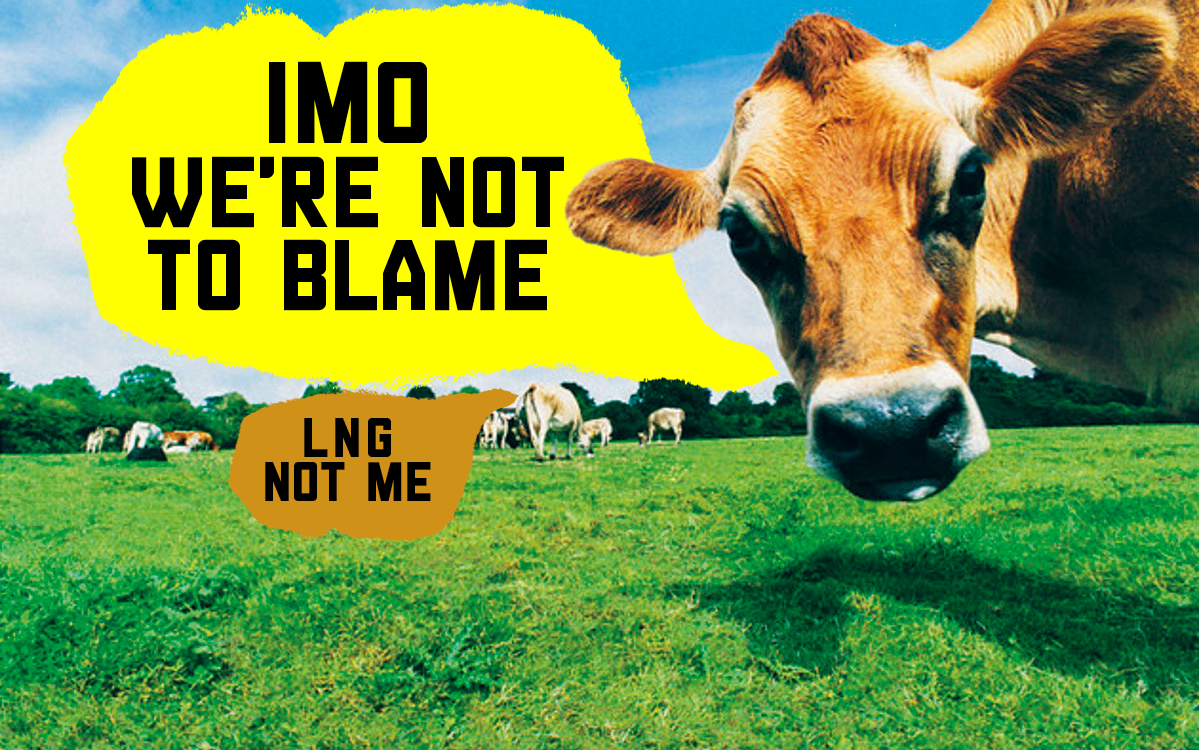NOT MY GAS

The cows are mad and they’re moooobilising to let everyone know it’s not their methane accelerating climate change, it’s shippings.
And they are right to be angry because the IMO is doing nothing to stop LNG becoming the fossil fuel of choice for shipping. In the European Union alone, consumption of LNG by ships has doubled from 2.2 million tonnes (Mt) in 2018 to 4.4 Mt in 2022. LNG uptake is based on the deceptive notion that it is an alternative, clean fuel. This is where LNG proponents are engaging in gaslighting, deceiving the maritime sector and all of us.
Liquid Natural Gas (LNG) – the facts
LNG is a fossil fuel that, when extracted, transported and burnt as a marine fuel, leaks methane into the atmosphere – a dangerous global-warming gas that is over 80-times more climate-warming in the short-term than carbon dioxide.
The UN’s Intergovernmental Panel on Climate Change (IPCC) identified rapid methane emission cuts as one of the top priorities in order to limit global warming to as close to 1.5°C as possible. The IPCC’s latest report focusing on climate mitigation makes clear that fossil gas in the form of LNG is not a solution for shipping’s decarbonisation.
Contrary to what climate science requires, shipping and port companies have been going full steam ahead in the wrong direction, investing heavily in fossil LNG, alleging that the fuel will reduce their environmental impacts and climate pollution. There are currently over 785 new cargo ships on order globally, with over 400 being built to run on fossil LNG.
Burning more fossil LNG onboard vessels is a disaster in the making for our planet. It would only increase methane emissions from ships, which already rose by 150% between 2012 and 2018, according to the UN International Maritime Organisation (IMO).
Methane emissions also decrease air quality. Additionally, increased demand for LNG—including in the marine sector—leads to adverse land-based impacts, such as polluted drinking water, reduction in crop production, and higher premature death rates.
Current Status of LNG and Shipping
Between 2012 and 2018, methane emissions from LNG-fueled ships grew by 150 percent (Fourth IMO GHG Study 2020). Real-world methane emissions from shipping also indicate that the sector’s contribution to climate change is larger than previously estimated. Despite the negative climate and environmental impacts, the shipping industry is projected to witness further growth in LNG demand, with the anticipated addition of about 160 to 500 new LNG-fueled vessels annually until 2030.
We Need Strong Methane Regulations at the IMO
According to the IPCC (AR6), addressing the climate emergency and its devastating impacts on people requires urgently tackling methane emissions in the near term. LNG proponents are gaslighting policymakers about the real size of the climate and health impacts of LNG while jeopardising a liveable future on this planet.
The International Maritime Organization (IMO) is the United Nations body regulating international shipping. Currently, no specific international regulations exist for methane emissions from ships. However, several opportunities exist to comprehensively integrate methane into the IMO’s regulatory framework during the upcoming 81st Marine Environmental Protection Committee (MEPC81) meeting scheduled from March 18 to 22. If this doesn’t happen we propose a more drastic future for the IMO.
Call for action at the IMO
Call for action at the IMO
1/ The IMO’s Life Cycle Assessment (LCA) guidelines: to ensure accountability for the real size of the sector’s methane footprint, the default emission factor for methane slip must be at 8.5% instead of the IMO’s current 3.5%.
2/ GHG Fuel Standard: methane must be meaningfully included in the IMO GHG fuel standard being developed at the IMO as a medium-term solution.
OR
3/ Declare the IMO is unfit for purpose
A failure act to regulate LNG will prove the IMO is clearly unfit for purpose. It only acts on behalf of the shipping industry and rarely considers the environment. Add to this the IMO’s continued backing of the fossil fuel industry, by not taxing shipping fuel and allowing the dirty fossil fuel byproduct HFO to be burned at sea, plus its lack of regulation of hazardous petrochemical shipping, and the list of IMO misdeeds and wrong directions begins to get very long indeed. Given this ever expanding list isn’t it time the environmental remit of the IMO is governed by another, better, UN agency? Life is too important to be squandered by inept bureaucracy.